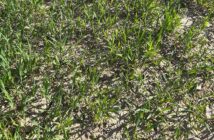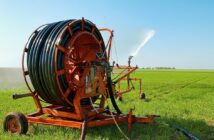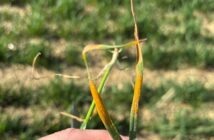Today, the Soil Association writes to all major UK bread companies and supermarkets. Wheat harvest will start in the next few weeks and we are asking bread companies to act now and put a stop to glyphosate use as a pre-harvest desiccant in their supply chains. The EU has just advised glyphosate use as a pre-harvest spray on food crops should be restricted – but it’s up to individual member states to decide if they want to implement this or not.
The letter sent on Monday 18 July
Going to: Tesco; Sainsbury’s; Waitrose; Morrisons; ASDA; Co-op; M&S; Warburtons; Hovis; Braces Bakery; Allied Mills; Bakers’ Federation; NABIM
Dear X
I’m writing to you about the latest European Commission decisions about the future use of glyphosate. The Soil Association is disappointed that glyphosate’s license has been extended until December 2017, although the fact that the 18 month extension is far shorter than the 15 years originally proposed has come as a huge blow to the pesticide industry.
As you may know, it is for Member States to apply further restrictions on the use of glyphosate, but the Commission made clear (http://europa.eu/rapid/press-release_MEX-16-2357_en.htm) that it supports three important curbs on glyphosate use that were recommended by the European Parliament. A Commission spokesman, said on 29th June: “These conditions include the ban of a co-formulant (tallowamine) from glyphosate-based products, obligations to reinforce scrutiny of pre-harvest uses of glyphosate, as well as to minimise the use in specific areas such as public parks and playgrounds”. Then on 11 July the European Commission announced that Member States had voted in favor of limiting the use of glyphosate, and that experts from the Member States had agreed these three conditions on future use of glyphosate, including ‘increasing scrutiny of pre-harvest use of glyphosate’. Enrico Brivio, Commission spokesperson for Health and Food Safety confirmed: “The member states today voted in favor of a proposal by the Commission to restrict the conditions of use of glyphosate in the EU” (11 July 2016).
In light of mounting evidence that has found glyphosate is not the benign chemical that you were led to believe, the Soil Association believes all these conditions must be implemented as soon as possible. For users of UK flour, the key step must be to ban the use of glyphosate as a pre-harvest desiccant on crops due to enter the human food chain, to prevent the powerful weed-killer being sprayed on food crops just before they are harvested. As you know, a ban on pre-harvest use of glyphosate on wheat destined for bread has been the focus of our Not in Our Bread Campaign. In view of the controversy surrounding the safety of glyphosate, the Soil Association is calling again for bread manufacturers and flour millers to insist on a glyphosate-free supply of UK cereals destined for human consumption, as there is still time to achieve this before this year’s harvest begins.
The response from UK bread manufacturers to our previous requests that you ensure that glyphosate is not used on the wheat that will supply the flour for your bread, has been to say that UK industry is waiting to see what was decided in Europe. The European decision has been taken. The short term and conditional approval for the continued use of glyphosate has clearly confirmed that there are, at the very least, doubts about the safety of glyphosate, and Member States have just agreed that there should be restrictions on pre-harvest use of glyphosate. The European Commission has also made clear that implementation of conditions on use is a matter for individual Member States. You will be aware that politicians in the UK are currently preoccupied with other matters, and it seems to us that as a responsible company producing bread in the UK, you must now take responsibility for the quality of your own supply chain.
Will you ensure that all of the flour you source from this year’s wheat harvest in the UK comes from wheat crops which have not been sprayed with glyphosate immediately before harvest?
Best wishes,
Peter Melchett
Policy Director
More detail:
Glyphosate safety different conclusions
Last year, the WHO’s IARC and EFSA both reached different conclusions on the safety of glyphosate. Given that EFSA’s review of glyphosate relies almost entirely on industry funded, unpublished studies, (to reach a different conclusion from the WHO) it would be unthinkable for them to come to any conclusion other than that glyphosate is safe to use. The reason that other eminent international scientists advising the WHO have already come to different conclusions is, as the EFSA themselves admit, purely because the other scientists are considering a much wider range of evidence than just industry studies, and they are looking at the impacts of glyphosate as it is actually used. Although glyphosate is always used in combination with a range of other often toxic chemicals, and although researchers have found that glyphosate mixes as sold to farmers and gardeners can be 1000 times more toxic than glyphosate acting on its own, EFSA insists on looking at the impact of glyphosate alone. It is blindingly obvious that the WHO approach is right from the perspective of public safety, and that the EFSA approach simply serves the interests of the pesticide companies.
The arguments about glyphosate have shone a harsh light on the secrecy surrounding pesticide regulation, from the three top-secret studies by pesticide companies, which the regulators have used to claim it is safe (but which they refuse to the public), to the scientists who insist their identities must remain secret as they take decisions on pesticides that affect the lives of millions of people.
EFSA decision
EFSA – European Food Safety Authority
The report concludes: “glyphosate is unlikely to pose a carcinogenic hazard to humans and proposes a new safety measure that will tighten the control of glyphosate residues in food”
Carried out a risk assessment & peer review
Risk assessment was carried out by Germany’s Federal Risk Assessment Institute (BfR)
Peer review group is made up of EFSA scientists and representatives nominated by EU Member States, they are all anonymous.
The scientists are independent experts with a three year mandate
The first part of the review assesses the use of glyphosate as a herbicide and for foliar spraying for desiccation in cereals
The second part of the review considers the findings from the IARC (International Agency for Research on Cancer) and finds that glyphosate is unlikely to pose a carcinogenic hazard to humans
The EU assessment only looks at the active ingredient glyphosate
The EU leaves the assessment of each marketed mixture to national governments/regulators
There were five industry-sponsored studies into the carcinogenicity of glyphosate on mice used in the EFSA decision, three of which have been dubbed ‘the mysterious three’ as they are not publically available (or available to the IARC) – two were identified or leaked, and non-EFSA scientists who have read then say they do not support EFSA’s case.
The World Health Organisation’s IARC decision
IARC International Agency for Research on Cancer (under the WHO)
Declares glyphosate is a category 2A ‘probable human carcinogen’
This was found as part of a review into the carcinogenicity of five chemicals (as well as organophosphates tetrachlorvinphos, parathion, malathion and diazinon)
Review was published in the Lancet Oncology
The IARC report looked at both glyphosate and glyphosate-based formulations
IARC assesses generic agents, including groups of related chemicals, as well as occupational or environmental exposure, and cultural or behavioural practices.
IARC assessed studies which were absent from the EU assessment (however these were added later according to EFSA’s website)
Looks at the impacts of glyphosate alone, and as it is used in mixtures
November 2015 – 96 prominent scientists from 25 countries to voice strong opposition to the EFSA report.



